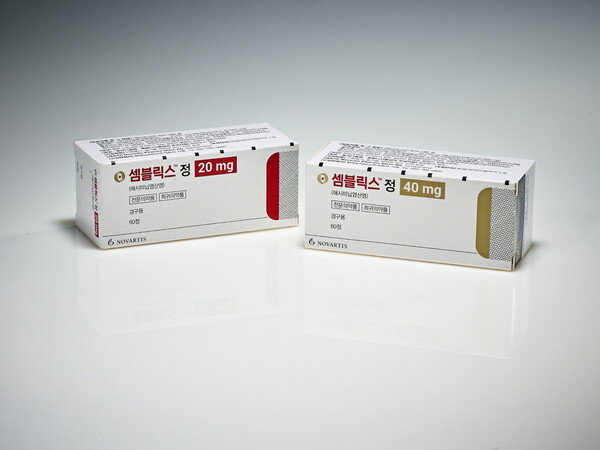Novartis Korea said its chronic myeloid leukemia (CML) treatment Scemblix (ingredient: asciminib) has received expanded approval from the Ministry of Food and Drug Safety (MFDS) to be used as a first-line treatment for newly diagnosed or previously treated adult patients with Philadelphia chromosome-positive chronic phase CML (Ph+ CML-CP).

CML is a malignant blood cancer that originates from the granulocytic cell line during the process of white blood cell formation.
While the disease progresses chronically, it can advance to acute leukemia if left untreated, necessitating timely intervention. Over the past 50 years, various tyrosine kinase inhibitors (TKIs) have significantly improved survival rates.
However, approximately half of CML patients fail to achieve the major molecular response (MMR), the primary treatment goal. Also, one in four patients discontinues or switches treatment within the first year, indicating a persistent unmet need for improved efficacy and tolerability in treatment options.
With this expanded indication, Scemblix now offers superior therapeutic benefits and tolerability as a first-line treatment for CML patients, thanks to its novel mechanism of action.
The approval was based on the ASC4FIRST clinical study, which involved 405 newly diagnosed Ph+ CML-CP adult patients.
The study compared the efficacy and safety of Scemblix against investigator-selected TKIs (imatinib, nilotinib, dasatinib, and bosutinib) and imatinib alone. The study's two primary objectives were to compare Scemblix's treatment efficacy against both investigator-selected TKIs and imatinib individually.
At week 48, Scemblix demonstrated a significantly higher MMR achievement rate than the investigator-selected TKI group (67.7 percent vs. 49 percent) and a nearly 30 percent higher rate than the imatinib group (69.3 percent vs. 40.2 percent).
Also, in terms of deep molecular response (DMR) achievement, an essential indicator of treatment-free remission (TFR), Scemblix nearly doubled the MR rate compared to investigator-selected TKIs (38.8 percent vs. 20.6 percent).
Scemblix also exhibited a favorable safety profile and superior tolerability. The incidence of adverse events leading to treatment discontinuation was the lowest among all study groups, while the incidence of grade 3 or higher treatment-related adverse events was also lowest in the Scemblix group.
"The introduction of TKIs, including imatinib, has significantly improved survival rates for CML patients,” said Professor Kim Dong-wook of the Hematology Department at Uijeongbu Eulji Medical Center, a co-author of the ASC4FIRST study. “However, given the chronic nature of the disease requiring lifelong medication, an optimal treatment should offer both strong efficacy and high tolerability from the outset.”
Scemblix has demonstrated superior MMR achievement and tolerability compared to first- and second-generation TKIs as a first-line treatment, he added.
Kim emphasized that as it is already widely used in third-line treatment, the expanded indication allows CML patients to benefit from its effectiveness at an earlier stage, increasing the potential for successful early treatment discontinuation and improving their overall quality of life.
Scemblix is the first STAMP (Specifically Targeting the ABL Myristoyl Pocket) inhibitor, which uniquely binds to the myristoyl pocket of BCR::ABL1. It was first approved in Korea in June 2022 for treating Ph+ CML-CP patients who had received at least two prior TKI treatments and was included in the national health insurance reimbursement system in July 2023.
Related articles
- Scemblix signals a shift in Iclusig’s monopoly status in Korea
- Novartis’ Scemblix gets benefit to treat chronic myeloid leukemia 3rd or more times
- BMS and Novartis’ myeloid leukemia treatments one step closer to being insured in Korea
- For years, a K-pop singer’s pain went unnamed. At a Novartis screening, he shared why.
- Korea green-lights Novartis’ Cosentyx for kids with severe psoriasis

